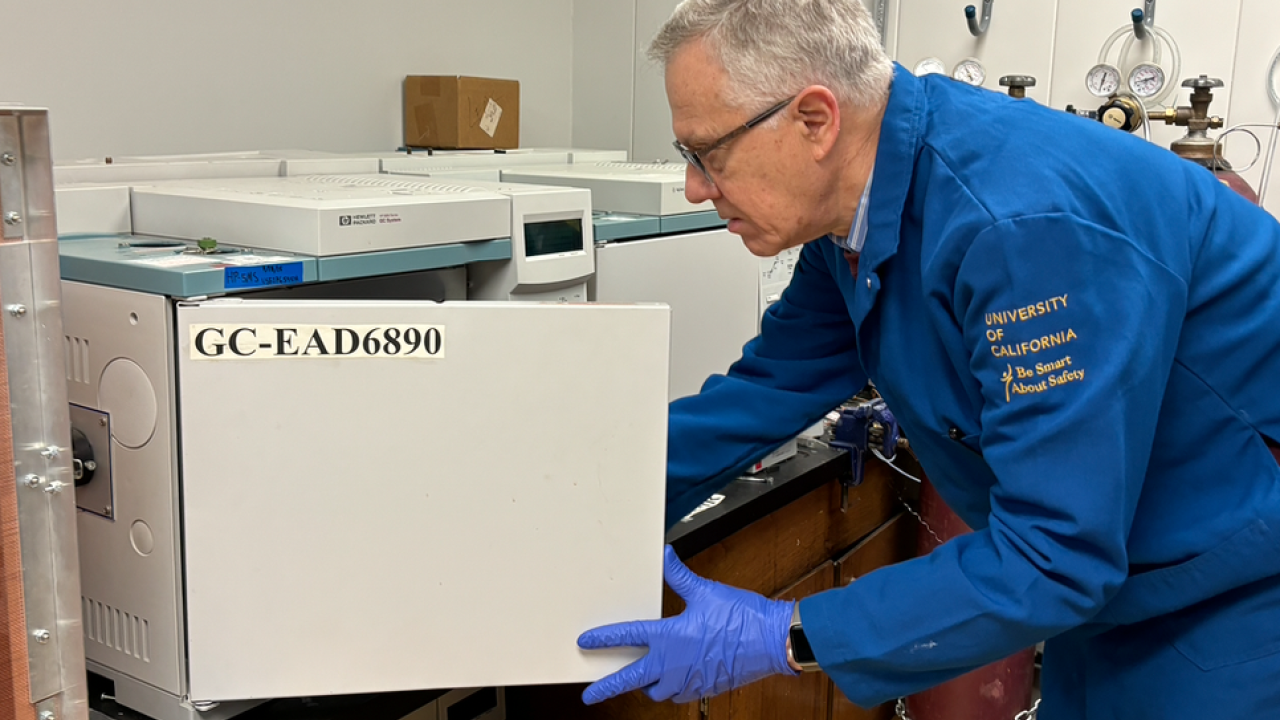
UC Davis Distinguished Professor Walter Leal: Academic Senate's Faculty Research Award
He Earlier Received Academic Senate's Teaching and Public Service Awards
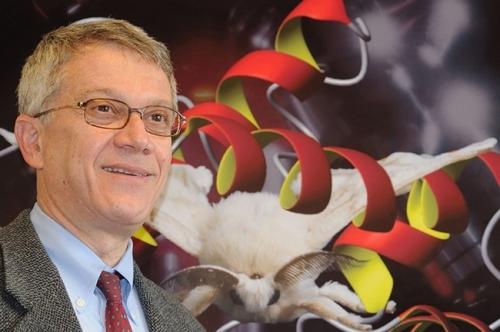
The saying, “Good things come in threes,” or “Omne trium perfectum,” rings true.
The UC Davis Academic Senate today announced that UC Davis distinguished professor Walter Leal of the Department of Molecular and Cellular Biology and former professor and chair of the Department of Entomology, is the recipient of the Faculty Distinguished Research Award.
And with that award, comes Academic Senate history.
Leal is the first UC Davis faculty member to be honored by the Academic Senate for all three of its awards celebrating outstanding teaching, public service and research. In 2020, the Academic Senate awarded him the Distinguished Teaching Award for Undergraduate Teaching, and in 2022 Distinguished Scholarly Public Service Award.
“Dr. Leal is an internationally recognized entomologist and a world leader in his field for his groundbreaking and transformative research in insect olfaction and chemical ecology,” said nominator UC Davis distinguished professor Bruce Hammock of the Department of Entomology and Nematology, who won the Academic Senate's Faculty Research Award in 2001 and its Distinguished Teaching (Graduate Students/Professional) Award in 2008.
Leal said he's honored and humbled to receive the award, but emphasized that “it's a team effort.”
'It is a team effort, like in a honey bee colony'
“Faculty at land-grant universities, like the University of California, have three hats labeled Teaching, Service, and Research,” Leal said. “A significant challenge is to budget time to wear them equally and avoid the temptation to emphasize one part of the job over others. It is gratifying to be recognized by my peers as excelling in all areas. The Academic Senate Faculty Distinguished Research Award is particularly humbling because more than 3000 eligible faculty excel in all research areas on this campus. Why me? Because of my students, postdoctoral scholars, visiting scholars, collaborators, and colleagues. They deserve most of the credit for this honor. I accept it on their behalf. It is a team effort, like in a honey bee colony.”
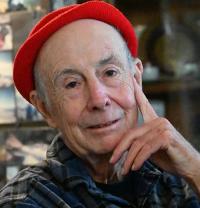
In his letter of nomination, Hammock wrote that he's known Leal for more than two decades. “He is truly a renaissance man. He chaired our entomology department from 2006 to 2008, and under his tenure, our department was ranked No. 1 in the country. I've long admired (1) his rigorous fundamental research programs supported by National Science Foundation, National Institutes of Health, and the U.S. Department of Food and Agriculture, and other agencies, (2) how he tackles and solves multiple challenging problems in insect olfaction and chemical ecology, (3) his grasp of how to organize and moderate highly successful worldwide research webinars (4) his generosity in helping other succeed and (4) his finely honed sense of humor. In his basic-to-applied science research, Dr. Leal solves entomological problems spanning agriculture, human health, and welfare. For example, he translates pheromone technology to agriculturists and serves as a principal investigator for the Pacific Southwest Regional Center of Excellence for Vector-Borne Diseases (affiliated with the Centers for Disease Control and Prevention). He holds more than 20 patents.”
“Walter has been exceptionally conscientious, active, and generous in professional service at UC Davis,” Hammock pointed out. "In August of 2021, he achieved a ‘first' for international science communication when he organized and led the extraordinary virtual conference ‘Insect Olfaction and Taste in 24 Hours Around the Globe.' I especially applaud him for elucidating the mode of action of the insect repellent DEET, developed in 1946 and known as ‘the gold standard of repellents.' Its mode of action remained an enigma for six decades until Walter's discovery. In researching the neurons in mosquito antennae sensitive to DEET, he isolated the first DEET-sensitive odorant receptor, paving the way for the development of better repellents.”
Hammock also called attention to Leal's odorant receptor work involved in the reception of mosquito oviposition attractants, and his work unveiling a circadian rhythm of sex pheromone reception in a scarab beetle.
Top 2 Percent of His Field
Leal is listed among the top 2 percent of his field, according to the 2023 World's Top 2% Scientists' List released by Stanford University and based on standardized citation indicators.
Neurobiologist John Hildebrand, International Secretary of the National Academy of Sciences (NAS), described Leal as “one of the world's most creative, distinguished, and productive entomologists and chemical ecologists,” who is “admired and celebrated for his research as well as his service and teaching.”
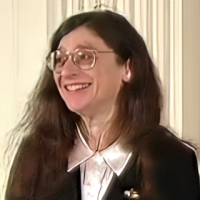
May Berenbaum, professor and head, Department of Entomology, University of Illinois-Urbana-Champaign, National Medical of Science Laureate, NAS member, and editor of the Proceedings of the National Academy of Sciences, wrote that “Dr. Leal is indisputably a world leader in the field of insect chemical ecology whose work over the course of his long and distinguished career has transformed basic knowledge of insect olfactory mechanisms and inspired innovative practical applications for sustainable management of insects of importance in agriculture and human health. He has contributed significantly to the current understanding of the structure and function of every component of olfaction, including receptors, binding proteins, and degrading enzymes, revising classic paradigms along the way. No textbook and no course on insect chemical communication could be considered complete without mentioning his landmark research achievements.”
Berenbaum related that Leal's 2013 review on odorant reception in insects, published in the Annual Review of Entomology, has been cited more than 1,000 times, attesting “to his stature as an intellectual leader in this critically important field.” She also praised his leadership, energy and organizational skills as co-chair of the 2016 International Congress of Entomology, held in Orlando, Fla., and which drew 6,682 registrants from 102 countries.
Rob Page: He is 'a spark plug'
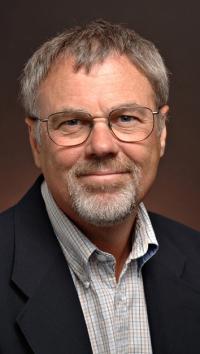
Robert E. Page Jr., provost emeritus, Arizona State University and emeritus professor and chair of the UC Davis Department of Entomology, wrote that “Dr. Leal instills energy into the academic system through his excellence in all he does and his boundless enthusiasm. He is an amazing teacher, mentor, and researcher. From the first time I heard him lecture, I have called him a ‘spark plug.' When I was University Provost for Arizona State University, I tried hard to recruit him but couldn't drag him away from UC Davis.”
Leal is a newly elected trustee of the Royal Entomological Society, the 13-member council that governs the 190-year-old international organization. He is the first UC Davis scientist to be elected a trustee. Leal succeeds Berenbaum as chair of the Council of the International Congresses of Entomology, the body that ensures the continuity of the international congresses of entomology.
Among his many honors: Fellow of the Entomological Society of America (2009), American Association for the Advancement of Science (2005), and the National Academy of Inventors (2019).
A native of Brazil, Leal received his Ph.D. in applied biochemistry from the University of Tsukuba, Japan, with subsequent postdoctoral training in entomology and chemical ecology at the National Institute of Sericultural and Entomological Science (NISES) and Cornell University, respectively. He was the first non-Japanese person to earn tenure at Japan's Ministry of Agriculture, Forestry, and Fisheries.
Leal joined the UC Davis entomology faculty in 2000, after serving as the head of the Laboratory of Chemical Prospecting, NISES, Ministry of Agriculture, Forestry, and Fisheries, Japan. In 2013, he accepted a position as professor of biochemistry, Department of Molecular and Cellular Biology.
